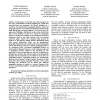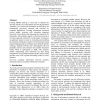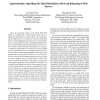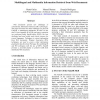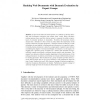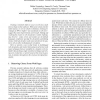136
Voted
DEXAW
2010
IEEE
15 years 3 months ago
2010
IEEE
In this paper, we describe our work in progress in the scope of information retrieval exploiting the spatial data extracted from web documents. We discuss problems of a search for ...
164
Voted
APCCM
2009
15 years 3 months ago
2009
Existing HTML mark-up is used only to indicate the structure and lay-out of documents, but not the document semantics. As a result web documents are difficult to be semantically p...
105
click to vote
IADIS
2003
15 years 3 months ago
2003
Indexing quality has an overwhelming effect on retrieval effectiveness of search engines. In the past few years it has become one of the major challenges in the search engines are...
138
Voted
CLUSTER
2001
IEEE
15 years 6 months ago
2001
IEEE
Given the increasing traffic on the World Wide Web (Web), it is difficult for a single popular Web server to handle the demand from its many clients. By clustering a group of Web ...
102
click to vote
DEXAW
2004
IEEE
15 years 6 months ago
2004
IEEE
Web documents present new challenges to conventional Information Retrieval (IR) technologies. This paper describes how these challenges are faced in FameIR, a multilingual multime...
146
click to vote
ICWE
2009
Springer
15 years 6 months ago
2009
Springer
The user observed latency of retrieving Web documents is one of
limiting factors while using the Internet as an information data source.
Prefetching became important technique ...
101
click to vote
PROMS
2001
Springer
15 years 6 months ago
2001
Springer
Replicating Web documents at a worldwide scale can help reduce user-perceived latency and wide-area network traffic. This paper presents the design of Globule, a platform that aut...
142
click to vote
DAWAK
2001
Springer
15 years 7 months ago
2001
Springer
Complex web information structures prevent search engines from providing satisfactory context-sensitive retrieval. We see that in order to overcome this obstacle, it is essential t...
114
click to vote
CAISE
2003
Springer
15 years 7 months ago
2003
Springer
Abstract. In spite of the wide use of the Internet, it is difficult to develop desirable web documents evaluation that reflects users’ needs. Many automatic ranking systems have ...
143
Voted
WSE
2003
IEEE
15 years 7 months ago
2003
IEEE
Cloning is extremely likely to occur in web sites, much more so than in other software. While some clones exist for valid reasons, or are too small to eliminate, cloning percentag...
